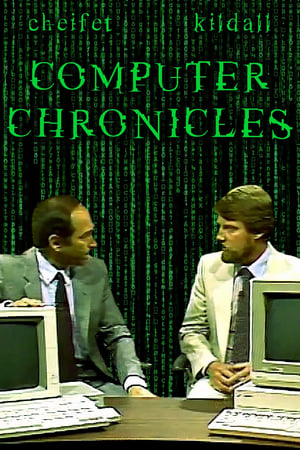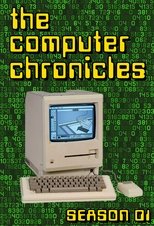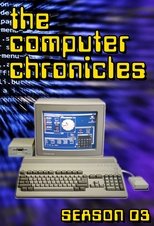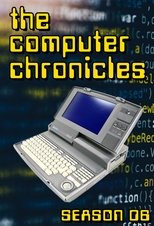
The Computer Chronicles was an American television series, broadcast during 1981-2002 on Public Broadcasting Service public television, which documented the rise of the personal computer from its infancy to the immense market at the turn of the 21st century. The series was created in the Fall of 1981, by Stewart Cheifet, then the station manager of the College of San Mateo's KCSM-TV, initially broadcast as a local weekly series. Jim Warren was its founding host for its 1981-1982 season. It aired continuously from 1981 to 2002 with Cheifet co-hosting most of its later seasons. Gary Kildall served as co-host for six years providing insights and commentary on products as well as discussions on the future of the ever-expanding personal computer sphere.
Showing Season 9 of 19
Season 9
1991
No overview available.
01. Macintosh System 7.0
1991-10-01
A look at the new 7.0 operating system for the Macintosh. Demonstrations include the finder, file sharing, publish & subscribe, virtual memory, and aliasing. Applications featured include Claris Works and Deneba's Canvas. Also a comparative look at the new DOS 5.0. Originally broadcast in 1991. http://archive.org/details/episode_909
02. Windows Applications
1991-10-08
With the advent of Windows 1.0, software vendors came out with new programs to take advantage of the new GUI operating system. This program demonstrates several of those new applications including Norton Desktop for Windows, WordPerfect for Windows, Lotus 1-2-3 for Windows, Microsoft Works for Windows, PFS WindowWorks, Microsoft Money, Visual Basic for Windows, Borland's ObjectVision, and Microsoft Publisher. Originally broadcast in 1991. http://archive.org/details/windowsapps
03. File Compression
1991-10-15
As files got larger and disk storage capacity stagnated, software developers came up with utilities to compress and shrink the size of files. This program looks at several examples including PKZip, Stacker, StuffIt Deluxe, DoubleUp, VideoSpigot, ReelTime, PicturePress, Impressit, Handmade Software, and Disk Doubler. Guests include Phil Katz, president of PKWare; Gary Clow, president of Stac Electronics; and David Schargel, president of Aladdin Systems. Originally broadcast in 1991. http://archive.org/details/filecompress
04. Computer Displays
1991-10-22
With color and graphics moving into the world of personal computers, display technology became an important subject. This program looks at several display solutions including Orchid Technology's Fahrenheit 1280 Graphics Accelerator card, NEC's MultiSync 5FG monitor, the Full Page Pivot Display and the Precision Color Display from Radius, and Mitsubishi's Diamond Pro 37" monitor. Also includes highlights from the Seybold Conference and Apple's new two page color monitor. Originally broadcast in 1991. http://archive.org/details/displays_2
05. Foreign Language Software (1991)
1991-10-29
A review of computer programs that help you learn or understand a foreign language. Featured products include Language Assistant Series: Italian, Transparent Language: German/French/Latin, Speak to the World in Spanish, Hyperglot Chinese, and Hyperglot Japanese. Also visits to the Foreign Language Center of the Defense Language Institute in Monterey, California and the Voice of America's System for News and Programming (SNAP) in Washington D.C. which operates in 45 different languages. Originally broadcast in 1991. http://archive.org/details/episode_920
06. Tandy/Radio Shack Computers
1991-11-05
No overview available.
07. Laptops and Handhelds
1991-11-12
Portability was becoming a big issue in the early 90's. This program looked at several new portable computing solutions including Grid Systems RS Wireless, the Momenta Pentop Computer, NEC's Ultralite Cellular Workstation, IBM's PC Radio, Apple's PowerBook 100, AST's Premium Exec Color Notebook, and HP's 95LX Palmtop PC. Originally broadcast in 1991. http://archive.org/details/episode_929
08. Computer Games (1991)
1991-11-19
A look at the hottest computer games in the early 1990's. Included are Wordtris, Crisis in the Kremlin, Earl Weaver Baseball II, Railroad Tycoon, Playmaker Football 2.0, King's Quest V, The Games: Winter Challenge, and TSN (The Sierra Network). Also features a visit to Lucasfilm Games and their development process for titles such as Indiana Jones, The Fate of Atlantis, Monkey Island 2, and Lechuck's Revenge. Another segment looks at the InGolf Simulator from TOP Pro Sports, a game which actually teaches you how to play better golf. Guests include Gilman Louie, President of Spectrum Holobyte, Michael Brook of Electronic Arts, and Bruce Shelley of MicroProse. Originally broadcast in 1991. http://archive.org/details/episode_932
10. PC Networks
1991-12-03
No overview available.
11. Consumer's Buying Guide
1991-12-06
No overview available.
12. Groupware
1991-12-17
Groupware was the buzzword of the early 1990s as users wanted to find ways to connect their personal computers, their applications and their data, and find platforms for sharing and collaborative work. This programs looks at several early examples including Lotus Notes, Higgins, Meeting Maker, Instant Update, Aspects, and BeyondMail. Originally broadcast in December 1991. http://archive.org/details/groupware_2
15. Integrated Software Suites
1992-01-07
The software trend in the early 1990s was to bundle different applications together in integrated office "suites". This program looks at several early integrated packages including LotusWorks, WindowWorks, BeagleWorks, ClarisWorks, AppleWorks, Microsoft Works and Ragtime for the Macintosh. http://archive.org/details/integratedso
17. Build Your Own PC
1992-01-21
Why buy a computer when you can build your own? This program looks at various approaches to assembling your own PC. Featured are the Chips and Technologies F8680 chip which is a complete PC on a chip solution, instructions on how to build your own 386 PC and 386sx PC, advice on how to perform a do-it-yourself upgrade to a 486s PC, and tips on building your own computer using components from ALR, Advance Logic Research. Originally broadcast in 1991. http://archive.org/details/episode_940
18. Computer Video
1992-01-28
The worlds of television and computers are quickly converging. This program looks at new video applications on personal computers. Included are the Video Toaster from NewTek, Impact Vision 24, and Scala for the Amiga, Video Spigot from SuperMac, Adobe Premiere, IBM's PS/2 TV, and the Actionmedia II board. Originally broadcast in 1992. Episode #941. Copyright 1992 Stewart Cheifet Productions.
19. Tax Preparation Software (1992)
1992-02-04
A look at early versions of tax preparation software. Included are demonstrations of J. K. Lasser's Your Income Tax, Timeworks' EasyTax 1991, ChipSoft's TurboTax for Windows and MacInTax, and Andrew Tobias' TaxCut for Windows. Also, a visit to the IRS headquarters in Philadelphia to see how they use computers and a look at how tax preparation software is tying in to personal finance packages. An example is Parson's Personal Tax Edge and Parson's Money Counts. Originally broadcast in 1991. http://archive.org/details/episode_927
22. MIDI Music
1992-02-25
A look at the new role of personal computers in making music. Products demonstrated include Super Jam from Blue Ribbon Soundworks, Encore for Windows from Passport Designs, EZ Vision and Studio Vision from Opcode Systems, and the Miracle Piano. The show incudes visits to the Stanford Center for Computer Research in Music and Acoustics and the annual National Association of Music Merchants (NAMM) convention is Los Angeles. Originally broadcast in 1992. Copyright 1992 Stewart Cheifet Productions.
23. Computers and the Disabled (1992)
1992-03-03
Computers can be a challenge for people with disabilities. This program looks at several options for making hardware and software that is user friendly for the disabled. Demonstrations include Berkeley Systems' Outspoken, Ke:nx, Co:Writer, Eureka A4, THINKable, Speech Viewer, the Unicorn Smart Keyboard, and ProsthesisWare. Originally broadcast in 1992. http://archive.org/details/disabled_2
24. Intel 486
1992-03-10
In 1992, the big issue was - is it worth the money to upgrade my 386 PC to the new 486 chip? This program looks at the performance of the new Intel 486 and helps users decide. Demonstrations include running AutoCAD on a 386 and a 486 PC; running an SQL database server on both processors; a look at the new SENSE 8 486 laptop from Dolch Systems; a look at how bus speed affects computer performance using a demonstration with Animator Pro; a review of Intel's Clock Doubler; and a look at 486 upgrade kit from Amkly Systems. http://archive.org/details/intel486
25. CD-ROM Software (1992)
1992-03-17
The introduction of CD-ROMS enabled a whole new era of more robust software applications. This program looks at several examples including Educorp's Dictionary of the Living World, Wayzata's Space Time and Art, French Language Software from VIVA 2000, the Voyager Company's Silly Noisy House, the American Business Phone Book, and Great Literature on CDROM from the Bureau of Electronic Publishing. Originally broadcast in 1992. Copyright 1992. http://archive.org/details/cdromsw
26. Space and Astronomy Software
1992-03-24
The first computer game ever was SpaceWars, written in 1962. Ever since then there has been a close relationship between space science and computer science. NASA could not exist without today's powerful computers. This program looks at space and astronomy software for consumers. Included are games such as Star Trek V, Space Quest V, Wing Commander II, and Spaceship Warlock. Astronomy programs demonstrated include Voyager the Dynamic Sky Simulator, The Sky for Windows, STS Orbit, VGA Trek, Star Trek: The Kobayashi Alternative, and Dance of the Planets. Also included is a visit to the Star Trek 25th Anniversary Exhibit at the Smithsonian Air and Space Museum in Washington. http://archive.org/details/episode_946
28. Easy to Use Database Software
1992-04-07
Database software is sometimes overwhelming to average users. This looks at some databases which are powerful yet easy to use. Included are Panorama from ProVUE, FileMaker Pro from Claris, Borland's Paradox, and FoxPro 2.0. Originally broadcast in 1992. http://archive.org/details/episode_947
30. Virtual Reality
1992-04-21
Virtual reality started out as a science fiction concept in the early 1950s. Now, VR has become a kind of holy grail - lots of promises and claims, few results delivered. This program looks at the state of virtual reality. Demonstrations include the Talking Glove, AutoDesk's Cyberspace project, the Virtual Hand, GestureGlove, CyberGlove, CyberCAD, Virtus Corporation's WalkThrough. Also a visit to the Virtual Reality Showcase at the Software Development Conference in Santa Clara, California. Originally broadcast in 1992. http://archive.org/details/virtualreali
31. Computers and Kids (1992)
1992-04-28
A look at how young people are using computers in school and at home. Featured applications include Operation Neptune from The Learning Company, HyperCard applications created by students, and several other programs created by middle school students. Also featured is a visit to Electronic Arts where students are used in a focus group to test new games. Originally broadcast in 1992. http://archive.org/details/episode_949
33. Computer Bowl IV: Part 1
1992-05-12
The fourth annual Computer Bowl contest in which techies from the east coast and the west coast challenge each other to see who knows more about computer trivia. Participants include John Warnock, John Shock, Heidi Roizen, Pamela McCorduck, Andy Rappaport, and Bill Machrone. The event took place in Boston. The questioners are Bill Gates and Stewart Cheifet. Originally broadcast in 1992. Copyright 1992. http://archive.org/details/episode_950
34. Computer Bowl IV: Part 2
1992-05-19
The conclusion of the fourth annual Computer Bowl contest in which techies from the east coast and the west coast challenge each other to see who knows more about computer trivia. Participants include John Warnock, John Shock, Heidi Roizen, Pamela McCorduck, Andy Rappaport, and Bill Machrone. The event took place in Boston. The questioners are Bill Gates and Stewart Cheifet. Originally broadcast in 1992. Copyright 1992. http://archive.org/details/episode_951
35. Diagnostic Software
1992-05-26
Remember IRQ settings, INITs, TSRs and "out of memory" messages? The early days of personal computers were confusing for most users and so a whole new category of software grew up around solving those problems - diagnostic software. This show looks at several examples including WinSleuth, Quarterdeck's Manifest, QEMM, Mac EKG 2.0, Snooper, QA Plus, and Norton Utilities. Originally broadcast in 1992. http://archive.org/details/diagnosticso
36. Comdex Spring (1992)
1992-06-02
Highlights of the annual spring Comdex show in Chicago. Featured guests include Bill Gates and Stewart Alsop. Originally broadcast in 1992. http://archive.org/details/episode_1001





